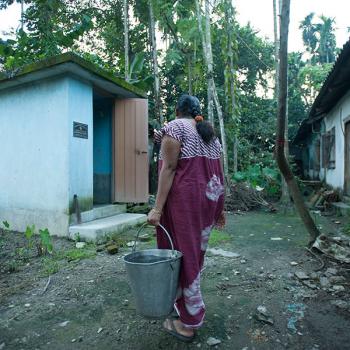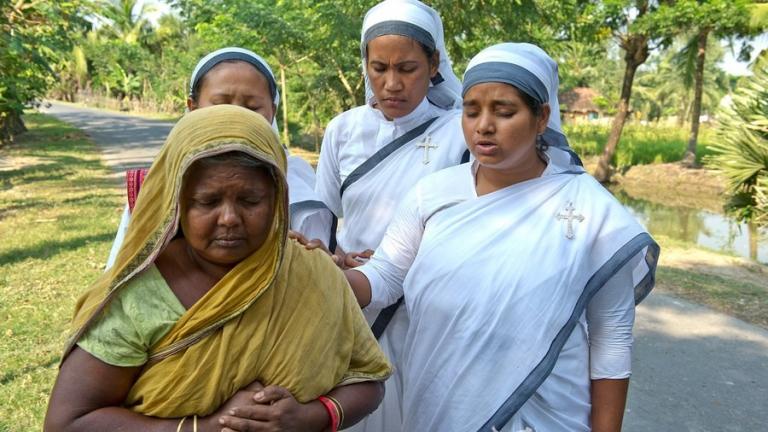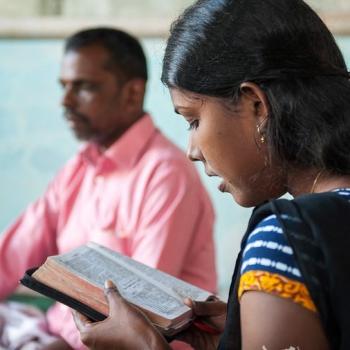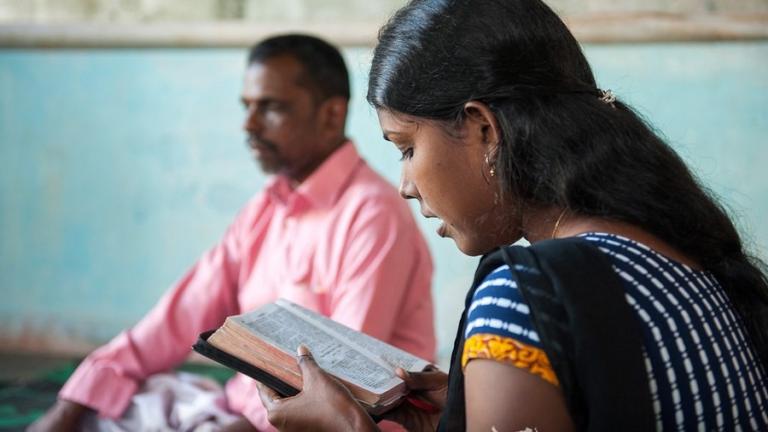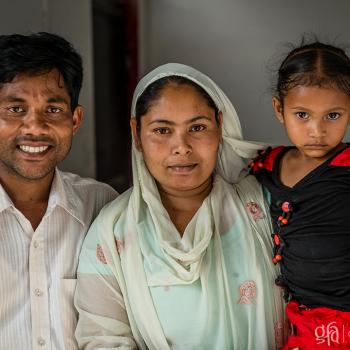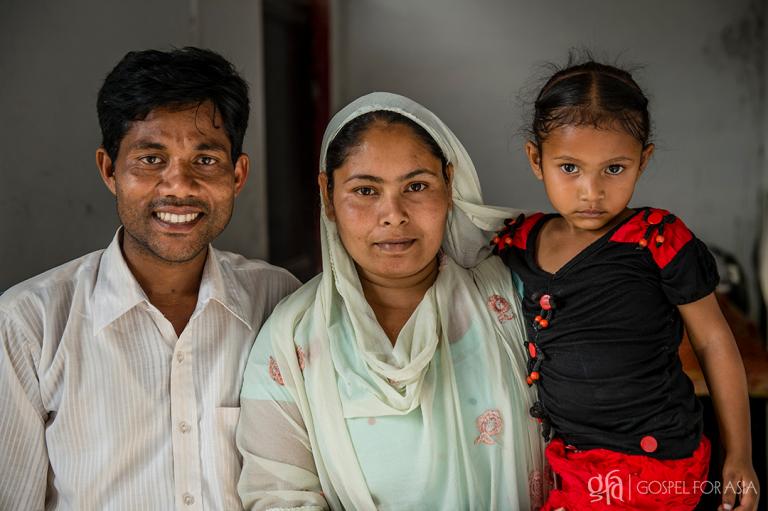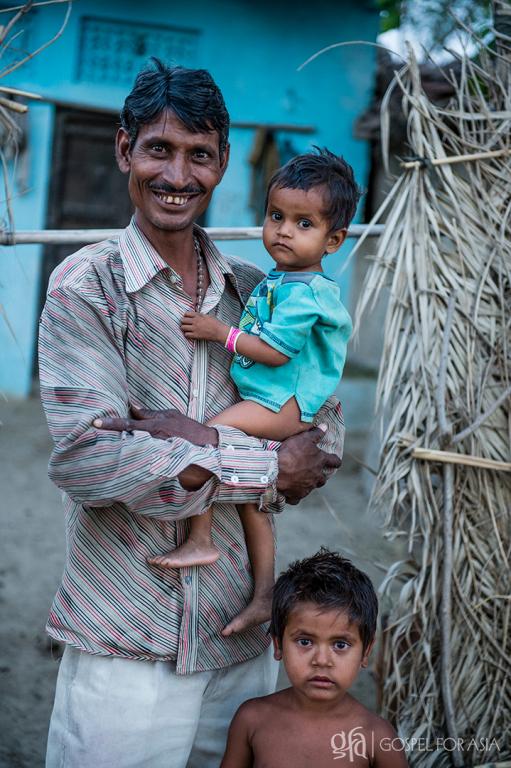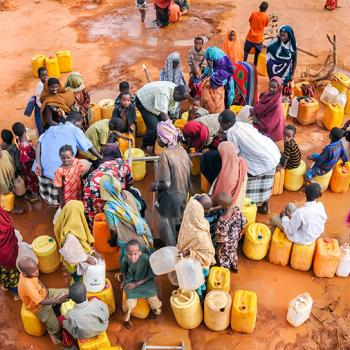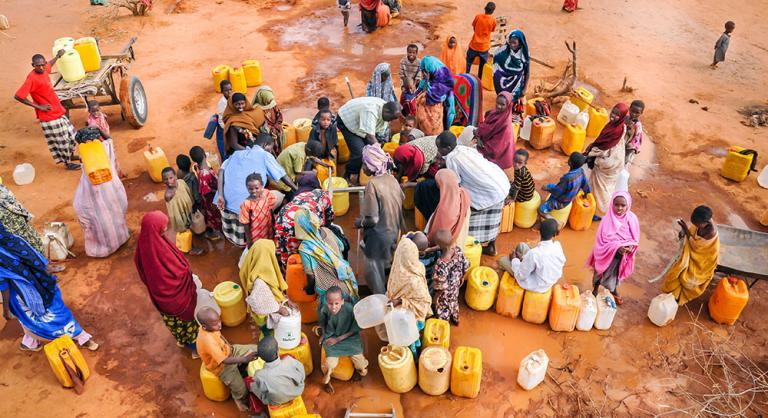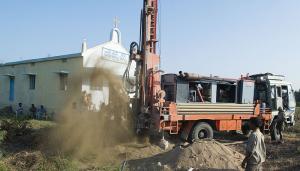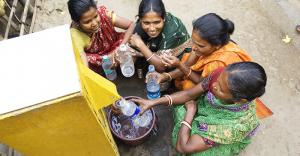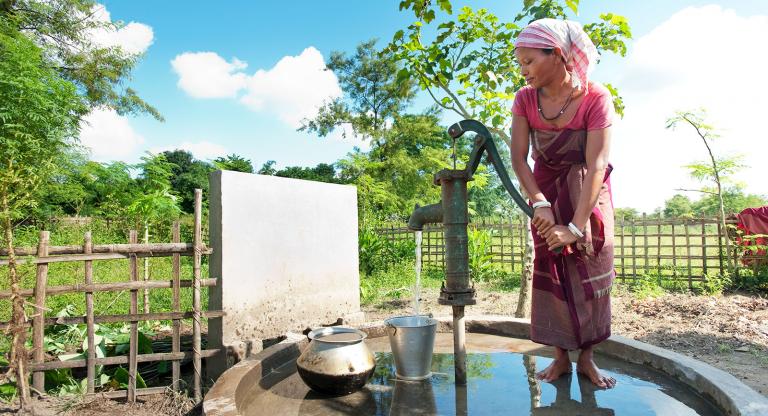Wills Point, Texas – Gospel for Asia Special Report (GFA) – Discussing the troubling problem of the lack of toilets – basic sanitation, and open defecation for millions throughout the world.
What If You Didn’t Have a Toilet?
So I remind myself of toilet scenarios I do know about, then extrapolate some personal situations out to extreme what-ifs. Our home, in which we have lived for 38 years, has its own septic system. During that time, when we had extreme storms, the power would go out. This meant that no water could be pumped from our underground well, and this electric outage disabled our showers, our faucets and our toilets.
I used to store plastic bottles of water so when things went black we could brush our teeth, get dressed by candlelight (since there are no windows in any of our bathrooms), and—get this—flush our toilets. If the power did not come back on for a couple days, the frozen food thawed and an excess of detritus threatened to overflow the toilet basin.
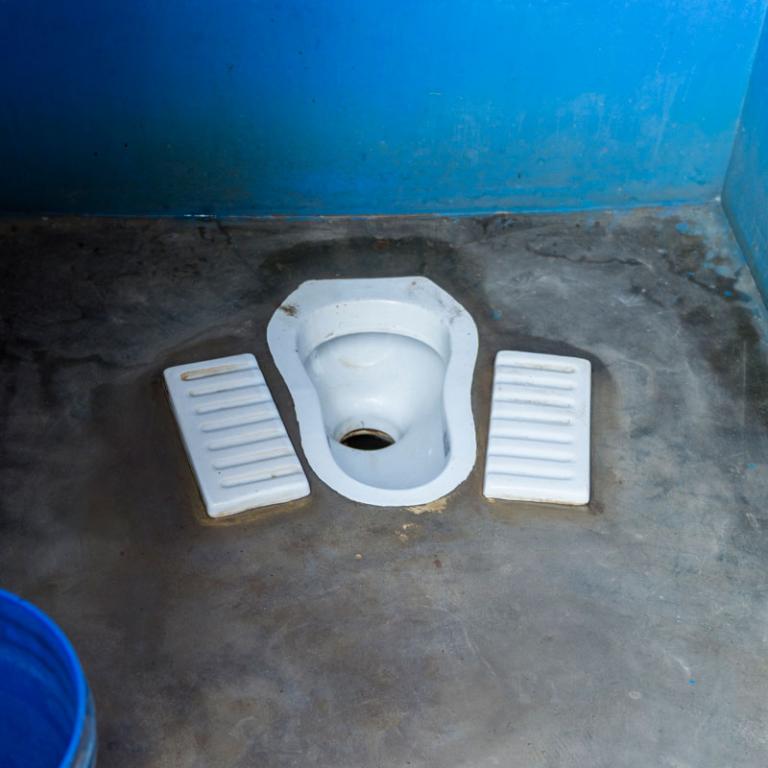
So I extrapolate—what if this happened all the time? What if sewer lines broke, became clogged and backed up regularly? What if I lived in poverty and there were no plumbers and no money and no electric company to call to fix our difficulties? What if I had to stand in line to use a communal latrine where flies buzzed, the floor was filthy, someone had evacuated due to acute diarrhea, and no one wanted to clean the mess? Now we’re getting closer.
In the refugee camps of the world, my travel companions and I held ridiculous discussions as to who had invented squat toilets—men or women? Someone shot a photo of me holding a rickety latrine toilet door upright while a woman co-worker trusted me to guard her privacy while she did her business inside. I am laughing, howling with laughter really, at a ridiculous situation, but this is, for most of the world, not a laughing matter.
Extrapolate. What if there was no female friend to hold the door? What if the floor around the squat toilet inside was filthy and you had to pull up your sari and rest the top half of the door against your forehead to keep it from falling? What if you believed that the little structures, dark and dank and scary inside, were really inhabited by demons?
Smelling an overflowing latrine from 20 feet away might persuade even a Westerner to think similarly, even if only metaphorically. In truth, I don’t like the few outhouses I’ve been forced to use in the States, nor many of the spooky national park public facilities, and I certainly avoid, if I can help it, those portable potties hauled in on trucks for public events or construction work sites.
When Your Septic Tank Problems Bring Embarrassment
My last attempt at toilet empathy. About 10 years after we had moved into our home in West Chicago, Illinois, our neighbor across the back yard knocked on the door and apologized for needing to complain about the standing, stinking water that was seeping into his property.
“I think you may be having trouble with your septic system,” he reported, embarrassed to have to point this out.
I called two septic companies. One told me I needed to have the whole septic field replaced; it would cost us $10,000. The other service man diagnosed another problem, but his estimate was about the same as the first. Then I went to the DuPage County Health Department and asked what septic firms they would recommend. I called Black Gold, whose reps complained about the septic map drawn by the original company that laid our field that was now leaking.
“Would the health department let us get away with a layout like this?” he asked his partner. They both obviously thought the field plan had been rendered by some septic idiot. Sure enough, after spending about 45 minutes prodding our three-quarters-of-an-acre lot with long poles, I was informed: “Lady, you don’t need no new septic field. The lines of what’s there ain’t connected to the tank.” His fee was $3,000. I made a garden out of the areas that were torn up by their repairs.
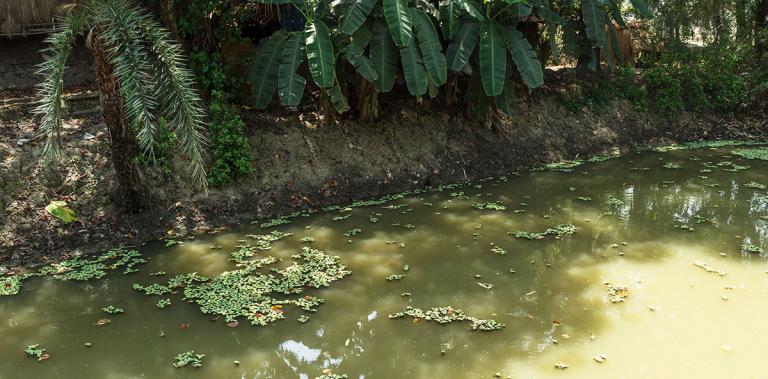
So what if I lived somewhere that permanently seeped smelly, vile, germ-ridden, brown liquid? What if the river at the back of the land was a running sewer, and my grandchildren couldn’t romp and splash in it? (As one writer vividly describes: “In stagnant reaches, methane bubbles up through the grey-green water, and the stench of rotten eggs—hydrogen sulfide—wafts into homes.”) What if the fields were filled not only with animal feces but the excreta of some 300 neighbors?
You come up with your own empathy-building stories.
Communities Band Together to Improve Sanitation
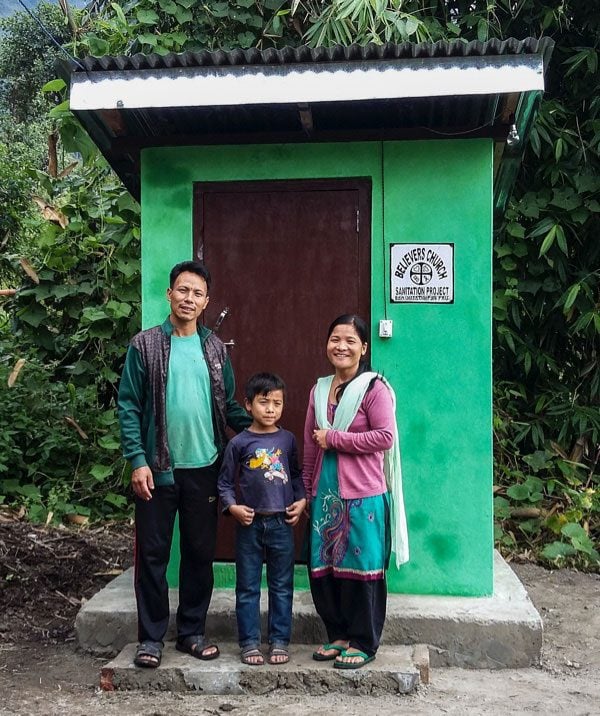
Prime Minister Modi and his teams are sold on community-led initiatives, and so should they be. Change works best when a whole population is committed to seeing it happen.
Elizabeth Royte wrote: “The Indian government is rewarding certified ODF villages by moving them to the front of the line for road or drinking-water improvements. It has launched an advertising campaign that exalts Swachh Bharat mascots, like the 106-year-old woman in Chhattisgarh state who sold seven goats to build two toilets. It has enlisted cricket and Bollywood stars to exhort people to use the new latrines.”
Community development often works best when it is exactly that: an idea that grows out of the mind of some visionary who lives within the locality that has a need, a visionary who is not only capable of strategic thinking but also feels empathy and who is moved by compassion by the people nearby—his or her neighbors. And when a whole community becomes involved in “cleaning up its act,” there are few powers on earth that can withstand such initiative.
Now what’s interesting about Gospel for Asia‘s stories surrounding sanitation is that it is the local pastor in the village, who out of concern and knowing that open defecation is a deadly disease-breeding potential, exercises his compassion to love his neighbors by being concerned about the availability of latrines.
This is an excerpt from one of Gospel for Asia (GFA)‘s stories called “Welcome to Their Toilet” that talks about how one community was forced to use the open fields to defecate because they had no other proper place.
The local GFA pastor, Vidur, understood the villagers’ struggle. He himself had been ministering in the area for more than 10 years. Knowing people’s lives were at risk whenever they used the fields as their toilet, he wished there were a way to help them.
Then he found out Gospel for Asia had started a program to promote sanitation in underprivileged areas. Excited about the opportunity to help his community, he asked his leaders to build four toilets in the village.
That’s when Janya and her husband, Lalan, gladly offered some of their land for one toilet.
In January 2013, when the villagers saw a concrete outhouse rise out of the dusty ground, they poured out their gratitude to Pastor Vidur and the church.
“[This] saved the lives of people from illness,” shared one villager.
Even the village leader expressed thanks. “[The church] is always concerned about the need of people and works hard for a brilliant life for the community,” he said.
What an extraordinary example of love in practical action.
“Love the Lord your God with all your heart and mind and strength. And love your neighbor as yourself.” —Luke 10:27
On the Brink of Innovations, Change in Sanitation
Toilet technology is on the edge of remarkable, cost-effective, ecologically friendly frontiers. They’re becoming self-cleaning and solar-powered. A solar-powered toilet that converts waste into charcoal that could then be used as fertilizer.
An indoor toilet that works like a garden composter, spinning the contents and reducing odor and the number of dangerous pathogens. Portable rickshaw toilets. A community bio-digester toilet designed to convert human waste into gases and manure. Once ideas begin flourishing, there is no limit to what can happen.
I’m banking on Prime Minister Modi’s ODF Campaign to be successful. The hardest pull of any new effort is most always at the beginning, but once new ideas start rolling, they gather momentum. Some of the new toilet technologies may become catalysts as well.
In addition, there are hundreds of international organizations working on sanitation solution. They understand that one size does not fit all the variables that make up the particulars in this vast discussion, but added all together, it is a prohibitive association with evidence of remarkable dedication.
“And when a whole community becomes involved in ‘cleaning up its act,’ there are few powers on earth that can withstand such initiative.”
A Canadian doctor, one of those “creative renegades” unhappy with the condition of the world and one whom I have come to admire and love, was appointed as a Provincial Health Officer in the highlands of Papua, New Guinea.
While making an aerial survey, he and his team discovered one village that was distinctly cleaner and healthier. Far below them was the evidence of what turned out to be a pastor with some basic health training who had taught his people those lessons, and the difference could be seen from the air. That one flight changed their lives. They began to search for a more integral way of ministering and soon began using and teaching a community health evangelism methodology, which had been developed in Africa.
Sometimes we get lost in the details on the ground. We need to stand back, take deep breaths and find some way to gather broader assessments—some kind of aerial view. Progress is being made; it’s just a little harder in some places than in others. I’m proud that Gospel for Asia is one of the players. Last year, GFA helped provide 10,512 toilets for needy communities throughout Asia.
Shout Out to Toilets!
Christianity has everything to do with sanitation. We serve a God who is expecting us to help restore the world He created to its original design. That is a world, among many other things, without rampaging diseases. One day, Scripture promises, it will be a world without death and suffering. So in this interim, let’s hear a shout out for all the toilets in the world!
Saving Lives at Risk from Open Defecation: Part 1 | Part 2
This article originally appeared on gfa.org
To read more on Patheos on the problem of open defecation, go here.
Go here to know more about Gospel for Asia: Youtube | Twitter | GFA Reports | My GFA | Instagram
For more information about this, click here.


